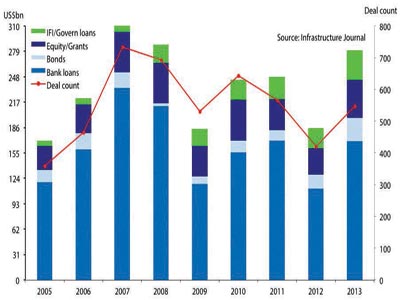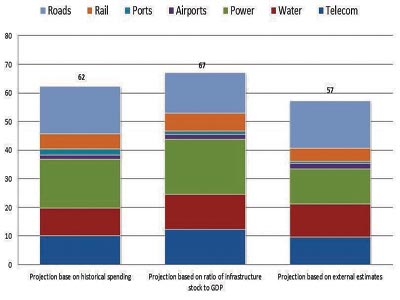
In the quest to attain social and economic stability, Nigeria and indeed, the global economies, have placed greater importance to infrastructure development. Of course, government at all levels are even using infrastructure as the focal point of their administrations, policy enactments and political strategy.
However, there is another side to the issues of infrastructure in development quests, which serves as a facilitator. It is about financing and that is where Nigeria banks have played roles. Infrastructure generally has to do with the provision of fixed (tangible) assets on which other intangibles (services) can be built upon and this includes housing, power (electricity), transport, education, communication, and technology.
The former Minister for Finance and Coordinating Minister of the Economy, Dr. Ngozi Okonjo-Iweala, had last year, put Nigeria’s infrastructure needs at N10.63 trillion ($67 billion), comprising road upgrades, bridge repairs, the energy sector, hospitals and schools.
Still on the issue, the former Head of Interim Government and Chairman of Infrastructure Concession Regulatory Commission (ICRC), Chief Ernest Shonekan, had at the inaugural meeting of the Africa Public Private Partnership (APPP) network hosted by ICRC, said that there is a yawning investment gap of about $31 billion required yearly to fund infrastructure development in sub-Saharan Africa.
The above scenario has always been followed by a statement that “government cannot do it alone”, which experts agreed, saying that for a success in mobilizing the needed capital for present and future infrastructural development and its attendant impact on survival and growth of businesses in Nigeria, the traditional funding methods can no longer suffice.
Already, Private Finance Initiatives (PFI) and Public Private Partnerships (PPP) have long emerged as alternatives and been adopted in the country, though they are relatively new models or concepts for public project finance. But commercial banks remain the formal source of finance for driving PFI among enterprises.
Nigerian banks, in recent times, have increased their stake in number of socio-economic projects bothering on infrastructural and natural resources rejuvenation, business growth and expansion initiatives, financed through equity and medium to long term loan packages. In the last five years, leading commercial banks in the country have continued to make strong mark the area of project financing.
However, a quick look at the country’s project financing market showed commendable influence being exerted by new players, which ordinarily, may be seen as greenhorns that lacked the skill, stamina and wizardry to play in the intricate game of project financing like Heritage Bank, which entered the market about 24 months ago.
Since its foray into the financial sector, Heritage Bank has made a mark in the equity and project financing market, arranging in excess of $2 billion of debt facilities either as lead or sole financier or financial adviser. The field of engagement, equally diversified, includes Micro Small and Medium Enterprises, entertainment and Arts, education, oil and gas, aviation, haulage and public sector.
For instance, the bank has facilitated over $100 million in funding for a variety of transactions in the film and entertainment industry from 2013 to date. These include Bloomberg TV Africa (the Pan African TV by Bloomberg LLP), Free-to-Air TV Broadcast Rights in Nigeria for the 2014 FIFA World Cup, HIP TV (a Pan African TV Music Channel broadcast on satellite TV, which was funded from scratch) and a variety of other investments spanning content, platforms and production.
Also, the innovative multi-billion naira Investment Protection Fund (InPF), which is a non-collateralized funding option with embedded insurance to address the default risk inherent in the SME Finance scheme, remained a strong differentiating factor of the bank’s approach to funding in the country.
The multiple financing of Forte Oil Plc’s acquisition of 100 brand new Mercedes Benz product delivery trucks for haulage, logistics and product transportation; Project Finance Facility to PIPP LVI GENCO for a 6.5MegaWatts Captive Power Generating Plant; and a 25 kilometre distribution network to power Public Utilities in Lekki, Victoria Island and Ikoyi, are giant strides by the young Heritage Bank, with bigger projects in Port Harcourt and Abuja in deals worth several billions of Naira in the last twelve months.
The Executive Director, Manila Banking, Niyi Adeseun, said: “For us at Heritage Bank, our core business philosophy as a timeless wealth partner to our customers is captured in our mission to create, transfer and preserve wealth. Our support efforts through project financing in the various sectors of the economy is one of the platforms that underscore our resolve and readiness to make a mark in the financial sector as a major pivot of socio-economic transformation of our country.
“For instance, in the oil and gas industry, our interventions span the downstream sector areas of product importation, supply, engineering and many more while we are also gradually getting really involved in the upstream as well. We have financed a few of such projects in Port Harcourt and we have a couple of them also in Abuja.”
Group Chief Executive Officer, Forte Oil, Akin Akinfemiwa, said: “We appreciate the strategic role of Heritage Bank in financing the acquisition of our latest 100 world-class product delivery trucks which, to us, is a very strategic investment that will substantially increase our capacity to grow our revenue and profitability and ultimately maximize value for our stakeholders”.
The greenhorn has comfortably played alongside the big banks like First Bank of Nigeria, which has leveraged on experience spanning over a century to build relationships and alliances with key sectors of the economy that serve as strategic building blocks for the wellbeing, growth and development of the country.
Of course, First Bank played key roles in the Federal Government’s privatisation and commercialisation scheme over the past years, led the financing of private investment in infrastructure development in the Nigerian economy.
The bank supports acquisition of stakes in Oil Mining Leases (OMLs), financing development of oilfields, financing cash calls for both operating and capital expenditures through Strategic Alliance Contracts.
“FirstBank has provided over $1 billion to part-finance acquisition of interests, as well as working capital for production to a number of OMLs; and an aggregate of about $500 million for construction and completion of Gas pipelines to Marginal Fields and Cement Plants.
 “We are at the forefront in financing power projects and has provided over $220 million to part-finance the acquisition of both Generating Companies and Distribution Companies under the privatisation of the Power Sector by the Federal Government,” the financial institution noted.
“We are at the forefront in financing power projects and has provided over $220 million to part-finance the acquisition of both Generating Companies and Distribution Companies under the privatisation of the Power Sector by the Federal Government,” the financial institution noted.



